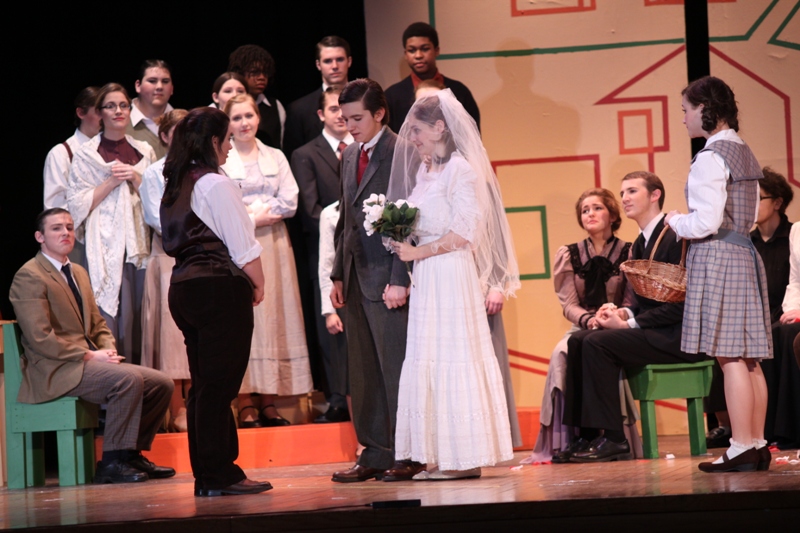
The cast of Emanon Players' OUR TOWN, running through February 5th at Penncrest High School in Media PA.
In the interest of full disclosure, I feel I should mention that I recently directed a production of this beautiful classic at The Players Club of Swarthmore. And I played Mrs. Gibbs at Hedgerow over a decade ago. I have a long and rich history with Wilder’s wonderful play. It is a perennial favorite of mine. The richness of its text and the aching simplicity of its story have always touched something in me.
While I was working on my production, I got a fortune cookie with my dinner before rehearsal one night; guess what it said?
“If you want to add value to your life, take care of every moment”
Well—that really struck a nerve with me. It definitely sums up the theme of Thornton Wilder’s OUR TOWN. At the time of its debut, it was very innovative and not everyone got it. It almost didn’t even make it to New York. It did however, and audiences there raved. The play went on to be nominated for several theatrical awards and gave Thornton Wilder his first Pulitzer Prize for Drama (his second was for The Skin of Our Teeth). The play has been in continual production around the world ever since—and much of today’s drama owes a large debt to this risk-taking piece of theatre.
This beautifully simple play was written to be performed without scenery, without props—even without period costumes if the director chooses. The focus is to be on the relationships between the characters in this small town at the turn of the last century. We are introduced to two families and their assorted friends and neighbors. Wilder’s text is an examination of the little things that make life so rich. Those tiny moments that so often we don’t value, don’t take care of.
Ensconced at the MacDowell Artist Colony in Peterborough, NH, Wilder took great inspiration from the area as he tackled his first full-length play. The play is set in the fictional town of Grover’s Corners, New Hampshire, but the story is universal; the playwright’s intent was to “set a small village against the largest dimensions of time and place.” We are shown the daily life of an “Any Town, USA” in Act I, followed by the courtship and marriage of George and Emily in Act II. Act III takes us to a whole different level of exploration. It is here that the playwright’s message really comes thru. It can be one of the most difficult acts for the actors to master—there are so many varied emotions at once; it’s a real challenge.
To be quite honest, I was very skeptical that high school students would be able to portray the characters and fully understand the scope of the message. I was pleasantly surprised. Director Kevin Nolen is to be commended for giving his students excellent guidance and getting some really good performances out of these young thespians. STAGE Magazine intern Becky Ferguson does a wonderful job in the pivotal role of The Stage Manager. The actor who portrayed it in my production referred to the role as the American Hamlet—it is a mountain of rather epic proportions for a performer to climb. Ms Ferguson does a solid job; she delivered the many monologues with a maturity beyond her years.
The roles of the young lovers, Emily Webb and George Gibbs are played by Laura Nolen and Justin Henry respectively. They have a really nice chemistry together and are very believable as two small town kids falling in love.
Their parents are played by Olivia Marcozzi and Michael Cohen as Doc and Mrs. Gibbs, and Zachary Shauerman and Samantha Dugan as Charles and Myrtle Webb. Each one inhabited their characters nicely—possibly having fun channeling their own parents. Laura Masse offered some nice comic relief as Mrs. Soames and Dave Zell handled the difficult role of Simon Stimson quite adeptly.
All of the performers did a great job with the intricate pantomime involved; you could always tell what task was being performed. Special kudos to some super sound effects work by Riley George and Caroline Weathers—they added great layers to the atmosphere—and some really good laughs.
The rest of the company (as The Stage Manager puts it “many others too numerous to mention.”) gets applause from my companion and I for a job well done. Be proud of yourselves and enjoy the rest of your run. I am impressed with the caliber of the school’s drama department and will look for some of these names in future area productions.
Wilder wrote OUR TOWN in 1938. The Great Depression still had a stranglehold on the nation’s economy, and there were rumblings from Europe that spoke of the possibility of another major war. Americans were scared for their future—and feeling defeated. Wilder’s story of a simpler time touched something deep in audience’s hearts and offered comfort and hope. It seems highly appropriate for theatres to revisit Grover’s Corners at this point in our history, in the climate we face today. Wilder’s ideas are still very timely—and timeless.
OUR TOWN
by Thornton Wilder
Directed by Kevin Nolen
February3—5, 2012
Penncrest High School Emanon Players
134 Barren Road
Media, PA 19063
http://www.rtmsd.org/page/3366


